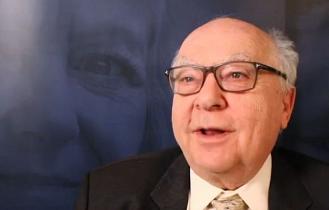Bill 96 harms all Quebecers: Julius Grey
The language law Bill 96 harms all Quebecers and seeks to reduce the province’s anglophones to an insignificant minority, constitutional lawyer Julius Grey told an Aug. 1 B’nai Brith Canada Zoom event.
“Everybody is worse off with a terrible, dreadful, repressive law,” Grey said.
The event, marking the first anniversary of the law, was moderated by Marvin Rotrand of B’nai Brith Canada’s League for Human Rights. Rotrand, after hearing Grey’s evaluation, referred to it as “grim.” Other speakers included Côte St. Luc Mayor Mitchell Brownstein, representing 23 municipalities challenging Bill 96; Joe Ortona of the English Montreal School Board; Hank Topas, Quebec regional director for B’nai Brith Canada and Andrew Caddell of the Task Force on Linguistic Policy. Numerous politicians and other community notables listened in on the call.
Grey said Bill 96 as a whole is egregious.
“Notwithstanding the official role of protecting French, the purpose of this law is simply to remove English. French is not really in danger anymore. Bill 101 had some justification, but this present law doesn’t protect French. What it is is simply a reduction of English services.”
Grey also spoke about the constitutional amendment aspect of Bill 96, in which the Canadian constitution would be amended to say Quebec is a nation and that French would be Quebec’s only official language.
“This threatens to take away the possibility of long-term judicial review...They’re demanding that the federal government change its language law to make Quebec only French. The federal government has said yes, I can’t understand that but there it is.....The constitutional amendment effectively, in the long run, I think, dooms Canada unless it’s overturned.”
Regarding the use of the notwithstanding clause to legally protect Bill 96, “Quebec has served us notice, we will not be held back by issues of human rights. The protection of fundamental rights is central to a democracy. Whenever it takes second place, it means that a democracy is at risk. Generalized use of the notwithstanding clause to get certain controversial policies without the possibility of judicial review is a threat to all of us and a threat to all of Canada.”
He also said Bill 96 is also trying to prevent lawyers and notaries from using English.
“It’s an attempt to force a French version on every procedure, and it’s calculated to make it impossible to use English. What client is going to pay extra [for an English translation of a required French document] when justice is so expensive anyway? It is an attempt to make the anglophones second class citizens before the courts....[in our justice system], bilingualism has worked perfectly.”
Grey added that the government has claimed healthcare would not be affected in terms of the provision of English services.
“Of course, that’s wrong. The issue is not only whether anglophones are allowed to speak English in certain circumstances, but they have an absolute rule that no francophone should ever have to speak English. Their principle is that everyone is entitled to speak only French....A premium on unilingualism is a terrible thing. But it’s worse than that, because they’ve defined anglophones in a very particular way. What they said is, since Bill 101, we’ve been trying to francisize the immigrants, so the only people who are legitimate anglophones are the ones who were using English before. The definitions vary, but in fact what they’re doing is limiting the right to use English to a very small group of people who identify themselves” as historic Anglophones.
Grey added that the government has said they are not checking that those claiming the right to be served in English by the provincial government have the right to be served that way.
“But, of course, it can be checked afterwards. Anybody who has any common sense will know that someone can get into trouble if they later found out that someone lied. Rights are being preserved for a small group of people. Most of this group left in the 1960s and 1970s....What this seems to be is an end to English services.”
Grey said he also thinks Bill 96’s provisions regarding CEGEP admissions and French tests to graduate are preparation “for an attack on McGill and Concordia.
“There will be fewer candidates and francophones will be discouraged from going there. They’re pretty overt about saying that they’re afraid those universities assimilate francophones, and therefore the reduction of McGill, Concordia, Bishop’s, etc. to junior colleges of some sort is going ahead full blast.”
Brownstein was more optimistic regarding Bill 96.
“I look at this as purely political, that the only reason the CAQ is doing what they’re doing is they want to get rid of the issue of separation and beat the PQ. The federal parties look at the whole issue of French preservation in Quebec as not a major issue in terms of getting them votes....We know it’s political, so what do we do? The courts.”














